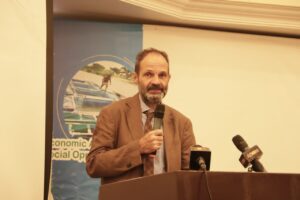Over 100,000 women, youth in Ghana benefit from EU-Funded Sustainable Agriculture Programme

The European Union and Ghana have concluded a five-year integrated programme aimed at strengthening climate resilience, promoting sustainable agriculture, and creating decent jobs in Ghana.
The programme, named the Civil Society Organisations in Research and Innovation for Sustainable Development (CSO-RISE), empowered Ghanaian farmers in the coastal and savannah areas to build a more sustainable and prosperous future.
It focused on improving living conditions for farmers in nine regions and sixty-three districts and municipalities across Ghana.
It harnessed the rich potential of the nation’s agricultural sector, covering the ginger value chain, fisheries, cashew, and beekeeping.
The grant partners – Action Aid Ghana, Cooperazione Internazionale Sud Sud, Centre for Local Government Advocacy, and Cerath Development Organisation – received €7.3 million to implement the projects designed to unlock economic opportunities for over 160,000 beneficiaries, 70 per cent of whom were women, youth and persons living with disability in the agricultural sector.
The Head of Cooperation of the EU Delegation to Ghana, Mr Massimo Mina, speaking at the closing ceremony in Accra stated: “The CSO-RISE Programme reflects the EU’s commitment to creating a more resilient and sustainable future for Ghana. It was carefully designed to contribute to inclusive growth and reduction of social inequalities through sustainable and climate-smart agricultural practices. The EU is determined to partner with African governments to identify and implement innovative solutions to reduce poverty and foster decent work in rural and peri-urban areas.”
In 2018, the European Union collaborated with the Government of Ghana to initiate a €9 million integrated programme aimed at enhancing the resilience and inclusivity of civil society organizations and communities, while promoting sustainable solutions to pressing economic and social challenges and reinforcing the sustainable management of ecosystems.
Mr Mina said the collaboration with the Government of Ghana, notably the Ministry of Finance, played a pivotal role in coordinating the programme, adding it is through such partnerships that we have been able to bring about meaningful change in the lives of Ghanaians.
The achievements of the programme include Climate-Resilient Agriculture which empowered over 12,000 smallholder farmers and women’s groups to adopt climate-resilient agricultural practices with 89 per cent of these farmers have embraced sustainable agriculture techniques, such as composting, improved seeds, woodlots, tree-crop-livestock integration, and agroforestry. These practices are not just about agriculture; they are about securing livelihoods and protecting our environment.
It also empowered women as the CSO-RISE distributed 35,000 high-yielding cashew seedlings and 35,000 mango seedlings to women’s groups across project areas.
Additionally, 20,000 individuals, including 50 per cent of women, benefited from climate-friendly beekeeping practices. The equipment provided, including beehives and honey processing tools, has not only boosted honey production but has also supported women in covering their families’ educational and healthcare needs.
Ghana’s agriculture and the fisheries sectors offer productive avenues to lift rural communities out of poverty in a manner that supports efforts at decelerating climate change and protecting the global ecology.
The CSOs, collaborating with key stakeholders and government agencies, implemented interventions to improve the value chain of the agriculture and fisheries sectors. Some interventions supported renewable energy and inclusive financing for small-holder farmers in the catchment areas.
New climate-friendly ovens for fish smoking that benefits over 20,000 women fishmongers that were set up in the Central, Western and Bono East regions are transforming lives and creating improved livelihoods for families. A ginger processing plant was also established to support smallholder farmers to add value to their produce.
The ceremony highlighted beneficiaries of the project in each location, offering participants an opportunity to experience the impact of the project on the lives of the people.
“While we close this programme today, the partnership of the EU and Ghana for climate-resilient agriculture and better incomes in rural areas will continue and grow – with additional support, which will be provided jointly by EU and its member states under the Team Europe approach”, concluded Mr Mina.
Mr Ebenezer Nortey of the National Authorising Office acknowledged the EU’s continuous support to Ghana’s development agenda, particularly in the areas of sustainable agriculture, climate change, general reforms, PFM, decentralization: employment and social protection.
He said Ghana continued to demonstrate commitment in tackling climate resilient issues, poverty and protecting the vulnerable from unexpected risks and shocks.
“With the National Climate Change Policy and Nationally Determined Contributions in place, Government is exploring various sources of financing climate action measures (being public or private, domestic, or external or both). The role of CSOs in pursuing climate ambitions cannot be underestimated, and this government recognizes too well.”
“As we bring the programme to closure today, let us carry the spirit of collaboration, innovation, and inclusivity forward as we work together to build a brighter future for our nation. The challenges we face are formidable, but the successes of the CSO-RISE Programme remind us that with determination and unity, there is no obstacle too great to overcome,” Mr Nortey added.
Source: GNA
